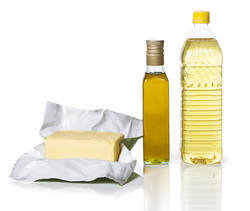 Butter, margarine, butter spreads and oils. It is confusing on which is healthiest with the abundance of mixed marketing and heart healthy labels, marketing and; did I say marketing? Seeing people I love pick up the tub of butter that says “made with olive oil” because of olive oil's known heart healthy benefits, fuels my desire to clear up any marketing misconceptions and write this blog. If you look closely at the ingredient panel, you will see that this specific product is made with partially hydrogenated oil. Not good; and not the olive oil you think you are getting. Here are clinically based evidence facts mixed in with my opinions. The Bad: Saturated Fats The Ugly: Trans fats The Good: Unsaturated Fats Butter is a saturated fat. Butter tastes good. Butter is real. Butter should be used in moderation. Butter is a Saturated Fat
Margarine is a trans fat (most cases). Margarine tastes ok. Margarine is processed. Margarine should be used in moderation if used at all. Margarines and Some Butter Spreads contain Trans Fats:
My preferred Butter Spread is Land O Lakes Spreadable Butter with Canola Oil:
Canola oil is a mono-unsaturated fat. Canola oil is a good, heart healthy fat. Canola oil is still a fat. Fats should be consumed in moderation. Canola oil is a good choice when choosing oils for sautéing meats or veggies, marinades, and in dressings. Canola Oil is an Unsaturated Fat:
Key Take-aways:
To learn more about the 2010 Dietary Guidelines for Americans visit http://www.cnpp.usda.gov/publications/dietaryguidelines/2010/policydoc/policydoc.pdf My wish for you is that healthy choices come easily. Make one today. Health Inspires.
0 Comments
Leave a Reply. |
Kathryn ScoblickMy passion and purpose is helping people reach their full potential and master their wellbeing. Categories
All
Archives
February 2021
|
|
Disclosure: Always consult with your physician or other qualified health care provider before beginning any diet or exercise program and ask whether you are healthy enough to engage in a diet and exercise program. Never disregard, avoid or delay in obtaining medical advice from your doctor or other qualified health care provider concerning your overall health and wellness, including your physical, mental and emotional wellbeing. If you have or suspect that you have a medical problem or condition, please contact a qualified health care professional immediately. It is your choice to follow the suggestions, opinions and advice given by a Health Inspires wellness coach.
|
